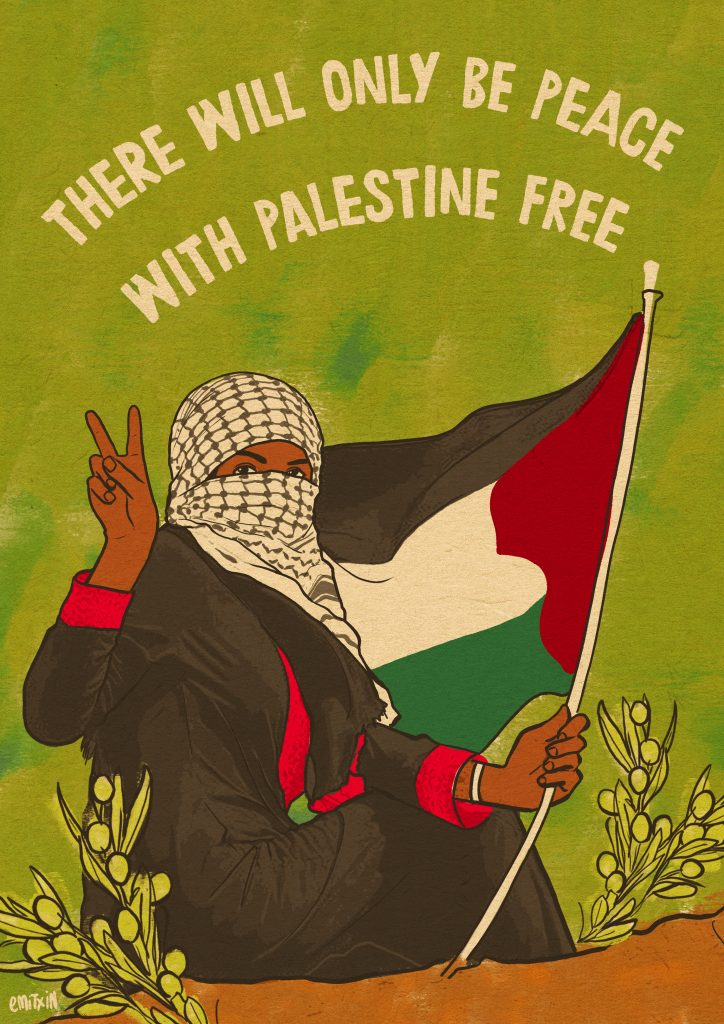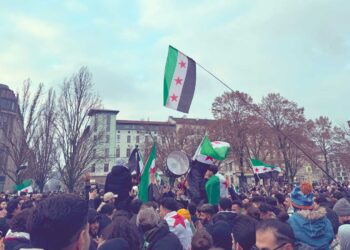In the face of the unprecedented genocide being perpetrated against the people of Palestine by the Zionist State of Israel, in co-responsibility with the powers of the Global North, Women, feminists, lesbians, transvestites, trans, queers and non-binary people from the Global South have formed a network to coordinate feminist and transborder actions in solidarity with Palestine.
Acción Feminista Global (AFG) represents a diverse space composed of women, feminists and diverse identities ranging from indigenous, Afro-descendant blacks, raizales*, migrants, peasants, academics, students, journalists, care workers, social leaders, trade unionists, artists, lawyers, land defenders, healers with ancestral medicine, and comrades with diverse life experiences that challenge the boundaries between urban and rural, among other trajectories that shape this space in constant construction. We are militants of political organizations, autonomous activists, we are part of feminist collectives and a plurality of spaces.
In our dialogues, held in transnational assemblies that bring together voices from a plurality of countries like Chile, Colombia, Argentina, Ecuador, Peru, the United States, Spain, France, Uruguay, Brazil, Bolivia, Mexico, Germany, Belgium, Venezuela, England and many others, we have dedicated ourselves to the elaboration of common theoretical, practical and political guidelines with the aim of establishing meaningful connections between the critical situation in Palestine and the territories of the Global South that we experience as members of this Network. We have identified the occupation of Palestine as a representative phenomenon of colonialist, patriarchal and capitalist globalization perpetrated continuously over decades and centuries by the powers of the Global North, severely affecting the right to life of our own bodies, territories and communities.
We understand that we share a common history, linked by experiences of colonization, imperialism, savage capitalism and extractivism, imposed by the economic and political power centers of the world, which are ruthless against the free self-determination of peoples. In addition, we recognize that the Israeli policy of colonization and expansion transcends the borders of Palestine and threatens the territories of Abya Yala through the massive sale of weapons and systems of surveillance and control of organizations and individuals, marketed across Latin America along with the installation of extractivist conglomerates such as the Israeli company Mekorot, which reproduce the dispossession in our territories and, in parallel, are co-responsible for the collective punishment of depriving the 2.3 million inhabitants of Gaza of water.
We have also seen how Israel calls itself “the only democracy in the Middle East” and promotes its so-called pro-women and pro-sexual and gender diversity policies. However, while it attempts to wash its image by appropriating our struggles, aspirations and desires, the reality is that it perpetuates violence and murder of Palestinian women, dissident identities and children, simultaneously strengthening patriarchal oppression across the territories of occupied Palestine. We, feminists, say it clearly: Not in our name!
This is how we are witnessing that Palestinian women are not only resisting patriarchal oppression inside Palestine, but also against the brutality of colonialism and Israeli occupation. Thus, in the face of the expansionist policy of colonization, Palestinian feminists fight for the defense of life and freedom for women, lesbians, transvestites, trans, queer and non-binary people, resisting comprehensively against all forms of violence and domination.
25N: Global Feminist Action for Palestine
In this context, solidarity with Palestinian women and people becomes an unavoidable commitment for anti-colonial and anti-capitalist feminists and dissident identities of Abya Yala and the Global South. For this purpose, a unified global feminist action was held in the context of the 25th of November, or 25N, International Day against Gender Violence. This action was replicated in all the territories where comrades of the Global Action participate, considering different criteria such as the facility to replicate actions in different territories (with their idiosyncrasies and characteristics) and the integration to the agendas and previous objectives of each territory for the 25N.

The political embrace.
After weeks of political debate and weaving of broad consensus among feminist collectives, political organizations and activists, the Feminist Manifesto for Palestine was built as a call to strengthen the Palestinian cause as a feminist cause. We did not invent anything: we echoed the profound interpellation that genocide made on our territories and our movements. With our eyes set on the defense of life, and the construction of internationalist solidarity, we connected our present and collective memory with the terrible present of the Palestinian people. This Manifesto was also quickly translated into ten languages, highlighting the internationalist and militant extension of our feminist networks. It was also read simultaneously in dozens of towns and cities around the world, and embraced by the whole transnational feminist movement as a tool for dialogue and construction of the Palestinian cause as a feminist cause.
The sensitive embrace.
We, as feminists, have learned that politics is also made by heart and embrace, enhancing the affectivities that unfold in our praxis. From the first day of the meetings, an image crossed our minds: the feminist scarf knotted with the kuffiyah: a sensitive weaving that crosses our territories and affirms us from the anti-colonial and communitarian feminisms. That image, like the Manifesto, crossed all the 40+ territories that joined the Global Action: banners, stickers, hand-painted flags, and also dozens of purple scarves and kuffiyas knotted in the Congress of Buenos Aires, Argentina, and in front of the mobilizations. The identification with the image was the identification with the feminist embrace.
The other feminist embrace, coming from the heart of our anti-colonial territories, was the construction of a song for Palestine. Taking the tradition of the song as a way of uniting politics with solidarity and the pain and injustice that cross us, the melody of “Que la tortilla se vuelva” took on body and voice once again. From the Spanish Revolution, passing through the industrial cordons of Chile in the 70’s and the new Chilean song, retaking the song of our peoples and giving collective voice to the embrace for Palestine, inscribes us once again in a genealogy of struggle and solidarity among peoples. In Colombia, in Chile, in the subway stations, in the streets of big cities, in the streets of small towns, we heard “Palestine is not alone / resist until victory / truth, justice and memory”.
And then?
After 25 November, with a brief cease-fire, the intensity of the massacre grows and the Zionist State of Israel advances by land and sky over the territories and lives in Gaza, laying bare its expansionist and genocidal objective.
Feminists know: this new Nakba is an attack against all the peoples of the world. We also know that Zionism’s ethnic cleansing in Palestinian territory seeks to deepen the dehumanization of oppressed peoples and to naturalize the cruelest violence against the bodies that resist the occupation. And that expanding the limits of violence is also a condition and objective for the strengthening of the right and extreme right in the world.
We also want to denounce the persecution that the Zionist lobby and its allies in our territories are carrying out against activists in solidarity with Palestine: criminal cases for “discrimination”; attempts of law reforms to prohibit acts of solidarity and against apartheid; labor dismissals, removal of artistic works; legal threats against public personalities, are some of the attempts to silence the voices that are being raised by millions around the world. We declare: they will not succeed in stopping us from talking about Palestine.
We call for strengthening solidarity and internationalist organization to stop the ongoing genocide, until Palestine is free, from the river to the sea: Defend the children to defend the future; Defend the elders to defend the collective memory.
From Abya Yala to Palestine: Feminist Resistance!
Ceasefire now! It is not war, it is genocide!
Enough of occupation and apartheid! Free Palestine!
*Raizales is an Afro-descendant people of the Archipelago of San Andres, Providencia and Santa Catalina.








